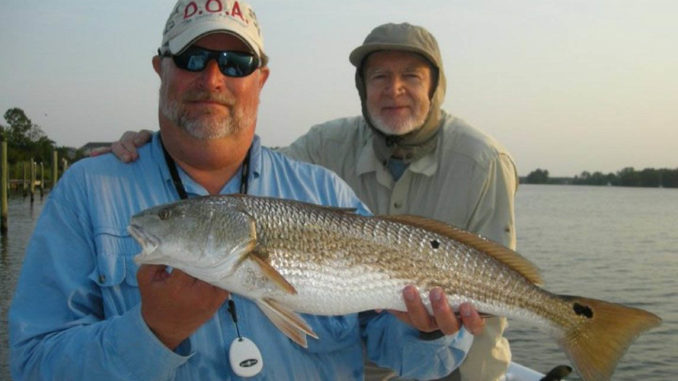
The scheduled public hearing for the North Carolina House of Representatives bill that would designate red drum, speckled trout and striped bass as gamefish in North Carolina coastal waters was postponed.
Originally, House Bill 353 was supposed to have a March 23 hearing at the Legislative Office Building in Raleigh, but one of the four major sponsors of the bill, Darrell McCormick (R-Iredell, Surry, Yadkin), said the delay before the Committee On Commerce and Job Development simply indicated the bill’s sponsors and co-sponsors (now numbering 24) wanted to gather more information.
“What we want to do is make sure we treat everyone fairly before we make a decision,” said McCormick, 50, a commercial real-estate developer from Yadkinville.
He said he didn’t know when the public hearing for the bill would be re-scheduled, but that it would come after the committee had talked to as many proponents and opponents of the move as possible.
H 353 has drawn fire from the commercial fishing industry in North Carolina, which has labeled the gamefish-status bill as legislation that would put many people out of jobs along the coast. They’ve called it a “selfish” bill for rich individuals only interested in being able to catch fish for sport and not the occupations of commercial netters.
McCormick said the bill was being heard first before the Commerce and Job Development Subcommittee on Business and Labor instead of another committee “because it is a jobs bill.”
“My job is to find jobs in North Carolina, and this bill (H 353) is a home-grown jobs-initiative bill,” he said.
How could that be, if what commercial fishing representatives are saying is true and it it would cost netters jobs?
McCormick said its “net” effect would be a huge increase in jobs.
“If it passes, it could help preserve 50,000 to 100,000 jobs on the coast because that many people are affected by attendant costs of sports fishing,” he said.
McCormick pointed out recreational fishing for red drum, spotted sea trout and striped bass “is a $2 to $4 billion industry.”
“Each pound of fish is worth $2 to commercial fishermen but worth $200 per pound when generated by recreational fishing,” he said. “The numbers seem very clear that this (bill) is something we need to do.
“Recreational fishing creates a huge economic impact, and this bill would make a large statement to other states’ fishermen that North Carolina is a good place to come and spend their money. It would draw in visitors and recreational anglers who are going to spend money on food, lodging, gasoline, boats, charters, clothing, licenses and fishing tackle.”
It also would increase the flow of tax money to the state, he said.
McCormick pointed out that, taken together, catches and sales of reds, speckled trout and striped bass comprise only 2 percent of the total annual income of commercial fishermen. For instance, relatively few netters target speckled trout.
“We have to make a decision whether or not we’re going to legislate a law for the benefit of 117 guys on the coast or whether we want to make a 2-percent sacrifice for them that can be a live-or-die situation for 15,000 other North Carolina citizens,” McCormick said. “This is an issue of being fair and equitable.”
Some critics of the bill have charged that it’s for the benefit of wealthy inland boat owners who visit the coast infrequently.
McCormick said he isn’t a boat owner nor does he own a home at the coast, but he enjoys surf fishing.
“I’ve fished with friends mostly at the Morehead area, Topsail, Indian Beach and Swansboro areas,” he said. “I rarely fish from a boat.”
The bill enjoys support from the Coastal Conservation Association of North Carolina, the Coastal Fisheries Reform Group and the Recreational Fishing Alliance.
McCormick said he loves coastal fishing and “loves the resource, and I don’t have a darn thing against (commercial) fishermen. But red drum have been protected for 20 or 30 years, and (all gamefish) are protected in freshwater.”
With the proposed $1 million buyout offer in the bill aimed at reducing its economic impact on netters, McCormick said he wonders if other factors aren’t involved in their opposition to H 353.
“I feel like (commercial fishermen) have overreacted since such a small percentage of their catch is these three fish,” he said. “I know it’s tough in these economic times to be a commercial fisherman, and anything (the government) does that doesn’t help you is seen as bad. But we’ll vet this bill through the legislative process and try to be fair to everyone.
“That’s why we’re meeting with the (North Carolina) Division of Marine Fisheries to try and get a real clear picture (of the bill’s) impact.”
McCormick said his committee will try to be fair in making a decision whether or not to report the bill to the House floor.
“We want to make sure all sides are heard and that we also don’t create a bill with unintended consequences,” he said. “We want to talk to enough people that we’re sure to do the right thing. But the numbers seem to be very clear that (H 353) is something we need to do (for job creation).”
McCormick said the large number of co-sponsors from both political parties mean the bill, as it stands, has broad political support.
Last year, with a Democrat-controlled House and Senate, a similar bill never reached the floor of either chamber for debate, but instead was locked away in a sub-committee by a chairman who took marching orders from Marc Basnight, the Democrat Senate Pro Tem from Dare County. After winning re-election, Basnight resigned before the 2011 legislature convened, citing health reasons.
“I already had some of the co-sponsors come to me and say they’re ready to go to work (on getting the bill passed),” McCormick said.


Be the first to comment